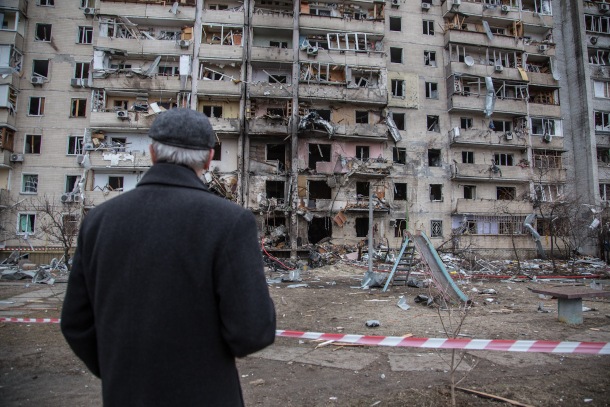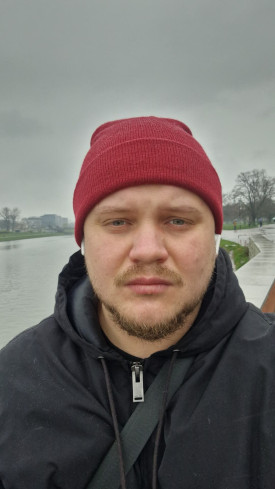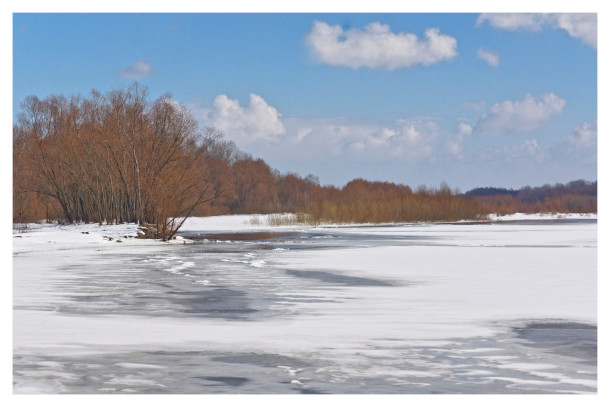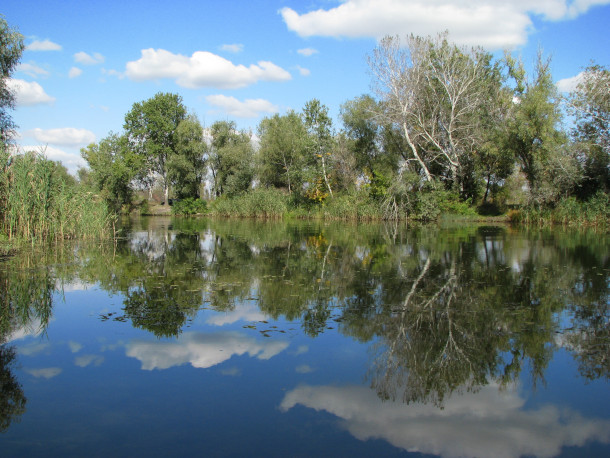'Ecocide' of Ukrainian River
Air Date: Week of October 25, 2024

A scene from Russia's war on Ukraine, which began in February 2022. The image shows the aftermath of destruction: buildings are in ruins, with debris scattered in the streets. (Photo: UNDP Ukraine, Flickr, CC BY-ND 2.0)
An explosion that spilled chemical waste into a river near the Russia-Ukraine border this August led to an ecological disaster with mass fish die-offs. Kyiv blames the Kremlin for a deliberate act of ‘ecocide’ amid the war that started with Russia’s 2022 invasion. Ukrainian journalist Artem Mazhulin reports for the Guardian and joins Host Jenni Doering to describe the impacts of the spill and the toll the war is taking on his country.
Transcript
BELTRAN: It’s Living on Earth, I’m Paloma Beltran
DOERING: And I’m Jenni Doering.
Russia’s war in Ukraine has brought a devastating human toll on both sides. Roughly a million Ukrainians and Russians have been killed or wounded since Russia launched its invasion in February 2022, according to recent reporting from the Wall Street Journal. Nature has also suffered amid the conflict, and Kyiv blames Russia for deliberately spilling chemical waste into a tributary to the Desna river in the north of Ukraine this August. Artem Mazhulin is a Ukrainian journalist who reported on this for the Guardian, and he joins me now from Kyiv. Welcome to Living on Earth!
MAZHULIN: Thank you.
DOERING: Now, where is the Desna River, and how important is it to the region?
MAZHULIN: Well, Desna River is located in the northeastern Ukraine, mostly in the north, and it's extremely important because that's where Kyiv takes water from. Which is Kyiv is the capital of Ukraine, the city of, I think three to 5 million depend on how you count. And apart from that, it's very important for the nature, for the ecosystem of the region. Desna river is very beautiful itself, with all the landscapes, the trees that grow, and it's very curvy. There's a famous, well famous in Ukraine novel... It's called the enchanted Desna, written by Alexander Dovchenko. He's a famous Ukrainian film director from 20th century, where he describes this river and the village where he grew up, near Desna, and telling how beautiful it was and it is still. And there's also quite big, wide river.
DOERING: So it sounds like the Desna River holds all kinds of different significance to Ukraine. I mean, ecological, historical, literary. Now, what's the state of the river in the wake of this alleged poisoning?
MAZHULIN: Well, the poisoning started, not in Desna River, right? So it started... There's another smaller river, It's called Seym river that flows into Ukraine from Russia. So there was an explosion... The town, Russian town called Tyotkino, on the very border of Ukraine with Sumer region. And as the result of this explosions, there were some chemicals from sugar plant that got into water, which caused the level of oxygen in the water went straight to zero. And since nothing can exist without oxygen, even in the water, so everything died in Seym river, and Seym river flows into Desna River, and it brought all these chemicals in, and it also killed, maybe not everything, but a lot of fish and other creatures that lived in the river. And yeah, so it was pretty bad. We saw just dead fish, and these clam shells on the river banks near Chernihiv, and smaller villages down the stream and the stench, it just smells, smells really bad, honestly, everything. And I've been to exhumations, you know, so I know what bad smell is. And that was pretty bad, one of the worst I've experienced.
DOERING: Wow. So you're talking about the stench from the river being comparable to the smell of bodies being exhumed?

Artem Mazhulin is a freelance Ukrainian journalist based in Kyiv. (Photo: Courtesy of Artem Mazhulin)
MAZHULIN: It's very different, but it's just the smell of sort of a death, just different kind of death, because human body smells like in a very specific way. But the fish smelled pretty bad, and then it's hard to describe what it was like. It was like because I grew up near the river. Another river that is also a front line now is called the Oskill River. So river always smells fresh. It's uh, trees, this forest, this water moving all the time, so it never smells bad, right? But when we were there by Desna, It just smelled it just smelled bad, and it had like some chemical smell in it, in the air by it. So I wouldn't normally, when I see river, I first thing I want to do just jump in and swim. And I did not have that desire back then, when we were standing it's just didn't feel like it, didn't feel safe.
DOERING: Now, you reported that Ukraine says this is an intentional act of ecocide used by Russia as a weapon of war. To what extent are there other plausible explanations for what's happened here, such as an accidental chemical release?
MAZHULIN: This town is just very close to the border, and between Russia and Ukraine, at the moment, is a very dangerous zone to be. So, there's a lot of explosion happening on both sides, shellings with artillery rounds. So it, you know, no one knows exactly what happened. Just the fact is the fact that those chemicals, those waste, got into water and they caused an ecocide, I think as investigation, we cannot investigate that, because that happened on Russian territory. So it's up to them, and I don't think we'll ever know what actually happened and who caused that, but I can tell you based on my experiences just reporting the war, if that was us, if that was Ukrainian army hit that thing by accident... The Russia would already be everywhere saying that that Ukraine hid this on purpose to blame Russia. So I think it was them. It's my opinion.

The Desna River partially frozen, with sheets of ice covering the water’s surface, surrounded by a serene winter landscape. (Photo: Marat Assanov, Flickr, CC BY-NC 2.0)
DOERING: How is Russia responding to these claims of ecocide?
MAZHULIN: I honestly didn't see any, any response at all.
DOERING: So just silence from the Kremlin...
MAZHULIN: Yeah, yeah. They don't care. I mean, they're busy with taking another village in Donbas. They don't care about ecology. They don't care about their own ecology. You know, the state of ecology in Russia has all this waste been thrown out? So why would they care about ecology in Ukraine?
DOERING: Now, what is Ukraine doing to try to mitigate the ecological damage here and protect the Desna rivers ecosystem?
MAZHULIN: So there's a special devices... They had nine or ten of those that they put in the water just to pump the air into... It's like a kind of as far as I understood, it's like a thing you put in your fish tank to keep the water clean and the oxygen level up for your fish, for your pet fish. So this just in much, much bigger scale, like a huge thing, just put in the in the water, and it was like pumping the air in in the river. And then, of course, they would pick up all the dead fish away, because it's summer. It starts to rot. It starts to smell pollution, bugs, bacteria, and so on and so forth. So it had to be taken away. And I know they took this dead fish to the old farming cattle where they, you know, when the farms, they bury their cattle when it dies or something. So they have the special burrying grounds. So they would bring that fish there. And the thing is that if the government could get involved and bring the State Emergency Service to like, bigger cities, so the smaller communities, like the villages, they had to do it on their own. So they had to bring this volunteers or ask people just to come together and pick up the dead fish.
DOERING: Artem, what's the mood like now that this war is dragging on and allegedly leading to ecocide?
MAZHULIN: It's harder and harder to keep up your spirit, to keep up your morale, because there's no visible end of this, and people are just tired. I have to say, what's next? What should we expect? It's just... Stop it. You know, we had enough. Let us at least deal with these problems. Because, again, you say, like, what can we do about it? We start doing one thing and then another thing happen. So this side of the war, it's just yeah, that we wouldn't talk. When you think of a war, it's mostly like, what explosions, destruction, capturing of village or town. But they don't usually talk about ecology. They don't talk about nature, dont talk about how animals are hurt as well.

A serene nature scene in Ukraine, showcasing vibrant forests and a calm river in the landscape. In the interview, Artem Mazhulin reflects on the enduring beauty of Ukraine’s natural environment, emphasizing the importance of preserving these stunning ecosystems amidst challenging times. (Photo: Mike Nykytenko, Flickr, CC BY-NC-SA 2.0)
DOERING: So of course, there's the Desna River we've been talking about, but Russia has taken over a large amount of Ukrainian territory, and I understand that some of that includes some of the like national park areas. What's happening there? What's the concern with Russian troops advancing in those areas?
MAZHULIN: We don't know what's happening there. It's completely out of our control, out of Ukraine control. So how are they taking care of it? Whether they taking care at all? We don't know. I come from a small town in eastern Ukraine, near the smallest National Reserve Park. It's called a small town Dvorichna near Kharkiv Oblast. So now it's a front line, and this park is on the chalk mountains. It's like, kind of like a white cliffs of Dover if you know, in England, it's like hills of chalk. It's white. When you look at the picture, and it's July and it's all white, you think it's a... Wait, why is that snow? It's not snow, it's chalk. It's really unique and beautiful nature. That's where I grew up. That's where my parents used to live before their house got destroyed. So we're fighting to get this territory included in the list of Ukraine national parks. So finally, in 2009 the National Reserve Park was created. So the ecologist came, there was some administration. They started doing some tourist routes. They brought in some introduced some new animals. There was finally protection from uncontrolled hunting. So there was something happening there, and now it's the... No. It's not only it's. No, it's not technically occupied because, but it's very, very it's in the right, in the front line at the moment, and it's being constantly shelled. It's completely destroyed. No one is residing there, apart from the military. There's no civilian life there. And we don't know what's happening in that park, what happened to the animals, what happened to the to the fish, to the wildlife. We don't know. It's just uncontrolled, and it's just the part where I come from. And there's much bigger parks in the southern Ukraine, Kherson Oblast, other parts of Ukraine. We don't, we don't know.
DOERING: Artem, you're living essentially in a war zone. What does this war cost you personally?
MAZHULIN: Well, my parents, they lost a house. My hometown is half occupied. Why is it half occupied? Well, technically, let's say where my parents house is that village is occupied by Russia. It's on a very front line, and where I used to go to school, that part is Ukraine control, but it's just across the Oskil River, so it's still being shelled, and no one lives there like my school is completely destroyed. Everywhere I used to go as a teenager to hang out, or it's all destroyed now. So yeah, I now live in Kyiv, and I'm lucky enough to have a good job and doing something useful for my country.
DOERING: Artem Mazhulin is a freelance Ukrainian journalist based in Kyiv. Thank you so much.
MAZHULIN: Thank you. Thank you for taking interest. It was a pleasure to share. Thank you.
Links
Check out the report by Artem Majhulin and Luke Harding for The Guardian
Explore Greenpeace's interactive map detailing the environmental damage caused by the war in Ukraine
Living on Earth wants to hear from you!
Living on Earth
62 Calef Highway, Suite 212
Lee, NH 03861
Telephone: 617-287-4121
E-mail: comments@loe.org
Newsletter [Click here]
Donate to Living on Earth!
Living on Earth is an independent media program and relies entirely on contributions from listeners and institutions supporting public service. Please donate now to preserve an independent environmental voice.
NewsletterLiving on Earth offers a weekly delivery of the show's rundown to your mailbox. Sign up for our newsletter today!
 Sailors For The Sea: Be the change you want to sea.
Sailors For The Sea: Be the change you want to sea.
 The Grantham Foundation for the Protection of the Environment: Committed to protecting and improving the health of the global environment.
The Grantham Foundation for the Protection of the Environment: Committed to protecting and improving the health of the global environment.
 Contribute to Living on Earth and receive, as our gift to you, an archival print of one of Mark Seth Lender's extraordinary wildlife photographs. Follow the link to see Mark's current collection of photographs.
Contribute to Living on Earth and receive, as our gift to you, an archival print of one of Mark Seth Lender's extraordinary wildlife photographs. Follow the link to see Mark's current collection of photographs.
 Buy a signed copy of Mark Seth Lender's book Smeagull the Seagull & support Living on Earth
Buy a signed copy of Mark Seth Lender's book Smeagull the Seagull & support Living on Earth

